Acupuncture is a traditional Chinese medicine practice that has been used for thousands of years. It involves the insertion of thin needles into specific points on the body to stimulate and balance the flow of energy, or Qi. In recent years, acupuncture has gained popularity in Singapore as a complementary therapy for a variety of health conditions.
There are many acupuncture clinics in Singapore that offer a range of services to cater to different needs. Some clinics specialize in pain management, while others focus on treating digestive disorders, respiratory problems, or gynecological issues. Patients can choose from a variety of acupuncture techniques, including traditional Chinese acupuncture, ear acupuncture, and electro-acupuncture.
If you are considering acupuncture in Singapore, it is important to find a qualified and experienced practitioner who can provide safe and effective treatment. Look for a clinic that is licensed by the Ministry of Health and has a team of certified acupuncturists. With the right practitioner and treatment plan, acupuncture can be a valuable addition to your healthcare routine.
Understanding Acupuncture
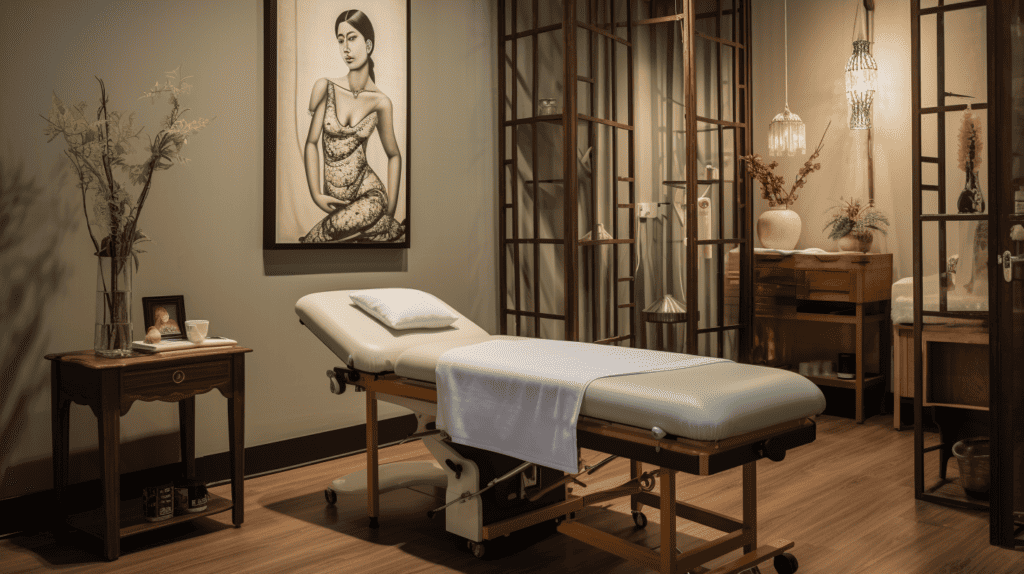
Acupuncture is a traditional Chinese medicine practice that has been around for over 2,500 years. It involves the insertion of fine, sterile needles into specific points on the body to stimulate the flow of qi, which is the body’s vital energy.
According to traditional Chinese medicine, qi flows through the body along pathways called meridians. Acupuncture points, also known as acupoints, are located along these meridians and are believed to be connected to specific organs and bodily functions.
During an acupuncture treatment, the acupuncturist will insert needles into the appropriate acupoints to help balance the flow of qi and promote healing. The needles used in acupuncture are very thin and are not typically painful.
Acupuncture can be used to treat a wide range of conditions, including chronic pain, headaches, digestive disorders, and anxiety. It is often used in combination with other therapies, such as acupressure or herbal medicine, to provide a holistic approach to healing.
While the exact mechanism of action for acupuncture is not fully understood, research suggests that it may stimulate the release of endorphins, which are the body’s natural painkillers. Acupuncture may also help to reduce inflammation and improve circulation.
Overall, acupuncture is a safe and effective therapy that has been used for thousands of years to promote healing and balance in the body. With the growing interest in alternative medicine, more and more people are turning to acupuncture as a natural way to treat a variety of health conditions.
The Health Benefits of Acupuncture
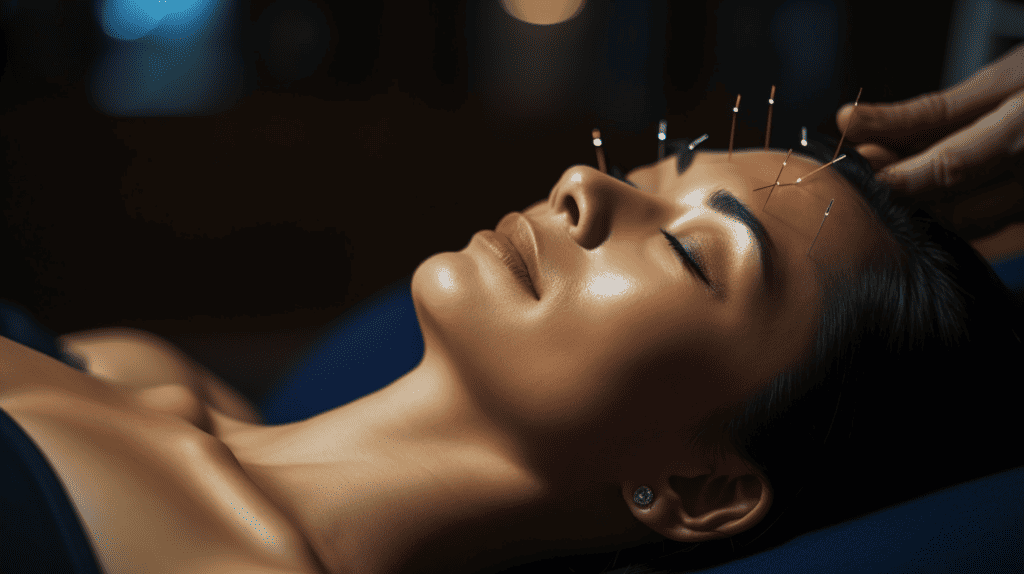
Acupuncture has been used for centuries as a holistic approach to healing and wellness. In Singapore, acupuncture is a popular complementary therapy for various health conditions. Here are some of the potential health benefits of acupuncture:
Pain Relief
Acupuncture is commonly used to alleviate pain, including chronic pain, neck stiffness, knee pain, and back pain. The acupuncture needles stimulate the nerves, releasing endorphins and other natural painkillers in the body. This can provide long-lasting pain relief without the side effects of medication.
Stress and Tension Relief
Acupuncture can also help reduce stress and tension in the body. The needles stimulate the nervous system, promoting relaxation and reducing anxiety. This can help improve overall mood and mental health.
Improved Sleep
Acupuncture can be an effective natural remedy for sleep disorders, including insomnia. This method promotes relaxation and helps regulate sleep patterns. This can lead to improved sleep quality and better overall health.
Improved Circulation
Acupuncture can help improve blood flow and circulation throughout the body. This can help reduce inflammation and promote healing in the body. It can also help improve skin conditions like eczema and promote overall wellness.
Pain Management
Acupuncture can be used as a complementary therapy for pain management, particularly for chronic pain. It can be effective in reducing various types of pain, such as migraines, osteoarthritis, and menstrual cramps. Acupuncture can also be used in conjunction with other pain management techniques for optimal results.
Improved Energy Flow
Acupuncture can help improve the flow of energy throughout the body, promoting overall wellness and vitality. It can help improve energy levels and reduce fatigue, leading to improved quality of life.
Overall, acupuncture is a safe and effective complementary therapy for various health conditions. It is important to consult with a licensed and experienced acupuncturist to ensure optimal results.
Acupuncture as a Part of Traditional Chinese Medicine
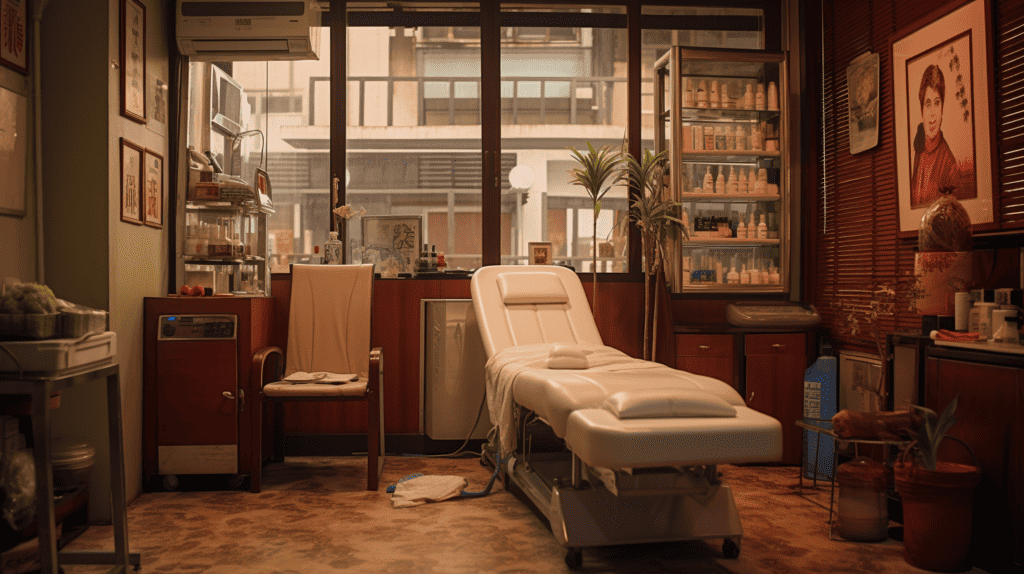
Acupuncture is a part of Traditional Chinese Medicine (TCM), which is a holistic system of healthcare that has been practiced for over 3000 years. TCM is based on the concept of yin and yang, which represents the balance between opposing forces in the body. According to TCM, illness is caused by an imbalance of these forces.
Acupuncture involves the insertion of thin needles into specific points on the body to stimulate the body’s natural healing processes. TCM physicians use acupuncture to treat a wide range of conditions, including lower back pain, arthritis, stroke recovery, high blood pressure, and acne.
TCM physicians diagnose patients by examining the pulse and observing the tongue and other physical signs. They then develop a treatment plan that may include acupuncture, herbal remedies, and dietary changes. TCM physicians believe that these treatments can help to restore the body’s balance and promote healing.
Acupuncture is a non-invasive treatment that is generally safe when performed by a trained TCM physician. The needles used in acupuncture are very thin and do not cause bleeding or discomfort. Acupuncture can be used to treat chronic conditions and is often used in conjunction with other treatments, such as orthopedics and internal medicine.
Research has shown that acupuncture can help to boost the immune system and promote overall health and wellness. Acupuncture has also been shown to be effective in treating conditions such as chronic pain and discomfort, as well as stroke recovery.
In conclusion, acupuncture is an important part of Traditional Chinese Medicine that has been used for thousands of years to promote healing and balance in the body. TCM physicians use acupuncture to treat a wide range of conditions and believe that it can help to restore the body’s balance and promote overall health and wellness.
Acupuncture Clinics in Singapore
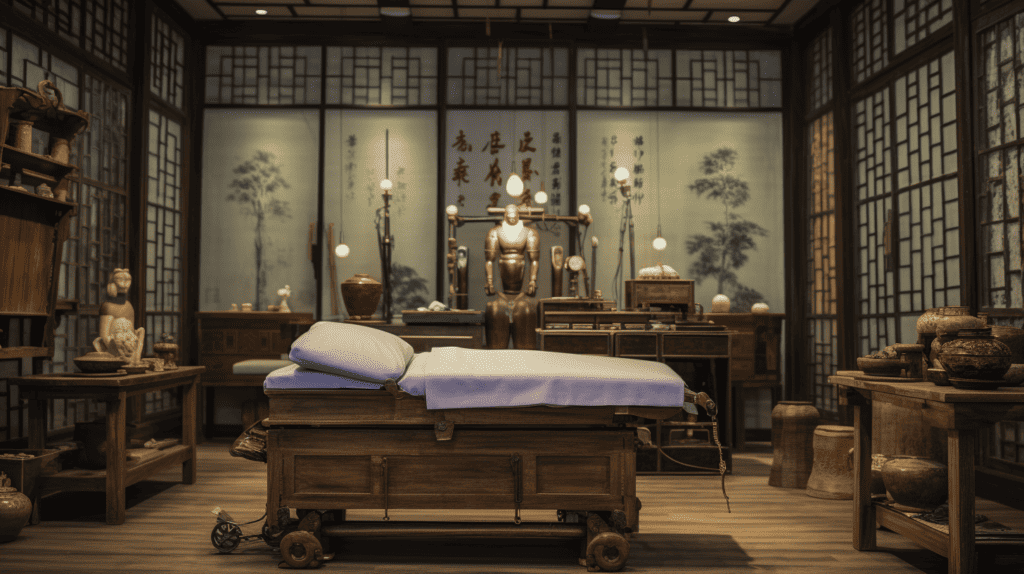
Singapore is home to many acupuncture clinics that offer traditional Chinese medical services. These clinics are led by highly qualified TCM practitioners who provide specialized treatment for various ailments.
One notable clinic is the Shanghai Chinese Medicine Centre, which offers a range of services including acupuncture, cupping therapy, and herbal medicine. The clinic is open from Monday to Saturday and has flexible operating hours, making it convenient for patients to schedule appointments.
Another popular clinic is the Grand Oak TCM Clinic, which promotes natural treatment as the means to achieve health and wellness. The clinic is open from Monday to Sunday and has a team of experienced TCM practitioners and attending physicians who provide personalized consultations and treatments.
For those seeking affordable acupuncture treatments, the Blessed Health TCM Clinic is a great option. The clinic offers acupuncture, tuina, and Chinese internal medicine services at reasonable rates. It is open daily from 8:00 AM to 10:30 PM, making it accessible for patients with busy schedules.
Other notable acupuncture clinics in Singapore include the Meng TCM Wellness Centre, which provides TCM medical consultations and complementary treatments, and the Ma Kuang Singapore TCM Clinic, which specializes in acupuncture and moxibustion therapy.
Overall, there are many acupuncture clinics in Singapore that offer quality TCM services. Patients can choose from a variety of clinics based on their needs, preferences, and budget.
Acupuncture for Specific Conditions
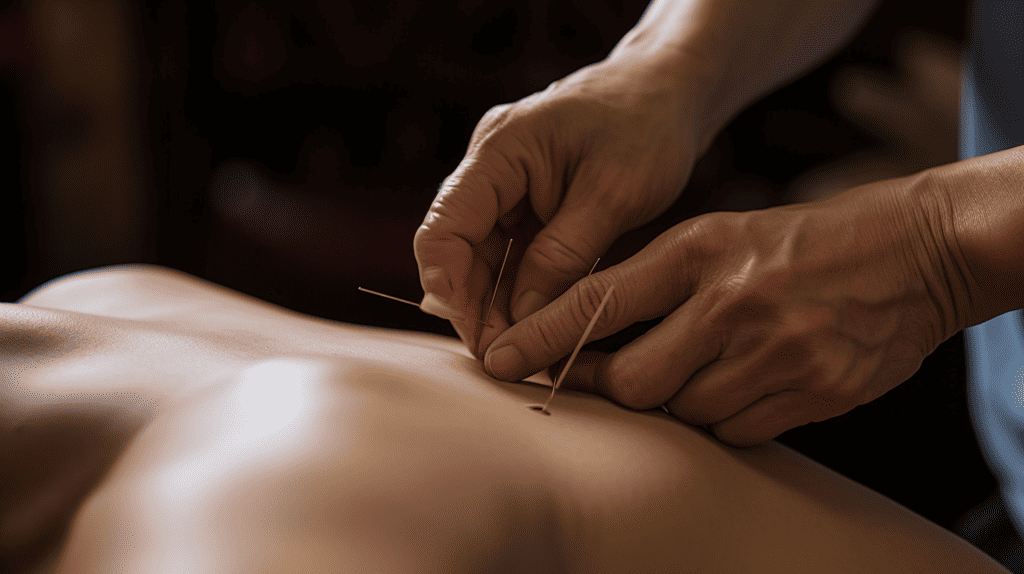
Acupuncture is a traditional Chinese medicine that involves the insertion of fine needles into specific points on the body. It has been used for centuries to treat a variety of conditions, including back pain, stroke, migraine, anxiety, hypertension, headaches, fertility, frozen shoulder, and depression.
One of the most common conditions that acupuncture is used to treat is back pain. Acupuncture can help relieve pain and improve mobility by stimulating the release of endorphins, which are the body’s natural painkillers. It can also help improve blood circulation and reduce inflammation in the affected area.
Stroke patients can also benefit from acupuncture. Acupuncture can help improve the patient’s mobility and reduce the risk of complications by stimulating the body’s natural healing processes. It can also help improve blood circulation and reduce inflammation in the affected area.
Migraine sufferers can also find relief through acupuncture. Acupuncture can help reduce the frequency and severity of migraines by stimulating the release of endorphins, which can help reduce pain and promote relaxation.
Anxiety and depression can also be treated with acupuncture. Acupuncture can help reduce stress and promote relaxation, which can help improve the patient’s mood and reduce feelings of anxiety and depression.
Acupuncture can also be used to treat fertility issues. Acupuncture can help regulate the menstrual cycle and improve blood flow to the reproductive organs, which can increase the chances of conception.
While acupuncture is generally safe, it can have some side effects, such as bruising, bleeding, and soreness at the site of the needles. Patients should also be aware of the risks associated with using unsterilized needles.
Overall, acupuncture can be an effective treatment for a variety of conditions. Patients should consult with a qualified acupuncturist to determine if acupuncture is right for them.
Regulation and Certification of Acupuncture in Singapore

Singapore has a well-established regulatory framework for Traditional Chinese Medicine (TCM) practitioners, including acupuncturists. The Ministry of Health (MOH) oversees the registration and regulation of TCM practitioners through the Traditional Chinese Medicine Practitioners Board (TCMPB).
Acupuncturists in Singapore are required to be registered with the TCMPB and hold a valid practicing certificate. The TCMPB registers TCM practitioners, accredits TCM institutions and courses, and regulates the professional ethics and conduct of registered TCM practitioners.
In order to be registered as an acupuncturist in Singapore, practitioners must have completed an approved local qualification in acupuncture from a traditional Chinese medicine training institution specified in Part III of the Second Schedule or any other training institution that is acceptable to the Board for the purposes of regulation.
The MOH has also issued guidelines on the provision of TCM services in hospitals and nursing homes, including acupuncture services. The guidelines state that the acupuncture service could be provided by the hospital’s own doctors (who are registered acupuncturists), TCM practitioners employed by the hospital, or TCM practitioners of a co-located TCM clinic.
In addition to traditional needle acupuncture, laser acupuncture is also offered in some TCM clinics in Singapore. However, the MOH has advised that laser acupuncture should only be performed by TCM practitioners who have undergone specific training in laser acupuncture.
Herbal medication is also commonly used in TCM, and the MOH has issued guidelines on the use of herbal medicine in TCM clinics. The guidelines state that herbal medication should only be prescribed by registered TCM practitioners, and that the herbs used should be from a reputable source and stored in a sterile and hygienic manner.
Some of the well-known acupuncture clinics in Singapore include the Shanghai Chinese Medicine Centre, Great Wall Acupuncture Clinic, and many others. These clinics offer a range of TCM services, including acupuncture and herbal medication, and are staffed by registered TCM practitioners.
Overall, the regulation and certification of acupuncture in Singapore is a well-established process, ensuring that TCM practitioners adhere to high professional and ethical standards.
Complementary Treatments

Acupuncture is often used in conjunction with other complementary therapies to enhance its effectiveness. Here are some of the most common complementary treatments used alongside acupuncture in Singapore:
Cupping
Cupping is a traditional Chinese therapy that involves placing cups on the skin to create suction. This suction is believed to help stimulate blood flow and promote healing. Cupping is often used to relieve muscle tension, improve circulation, and reduce inflammation. It is sometimes used in combination with acupuncture to enhance its therapeutic effects.
Massage
Massage therapy can be used to complement acupuncture by helping to relax muscles, improve circulation, and reduce stress. Massage can also help to stimulate the release of endorphins, which are natural painkillers produced by the body. Acupuncturists may use massage techniques such as acupressure or Shiatsu to enhance the effects of acupuncture.
Medications
In some cases, acupuncturists may recommend the use of herbal or nutritional supplements to complement acupuncture treatment. These supplements can help to support the body’s natural healing processes and enhance the effects of acupuncture.
However, it is important to consult with a qualified practitioner before taking any supplements, as some may interact with other medications or have side effects.
Blood
Some acupuncturists may recommend bloodletting as a complementary therapy to acupuncture. This involves the controlled removal of a small amount of blood to help stimulate the body’s natural healing processes. Bloodletting is often used to treat conditions such as high blood pressure, headaches, and menstrual disorders.
Frequently Asked Questions
- What is the difference between acupuncture and acupressure? Acupuncture involves the insertion of thin needles into specific points on the body, while acupressure involves the application of pressure to these same points using the fingers or other tools.
- Is acupuncture safe? When performed by a qualified practitioner, acupuncture is generally considered safe. However, there are some risks associated with the practice, including infection, bleeding, and nerve damage.
- Does acupuncture hurt? Acupuncture needles are very thin and are inserted gently into the skin, so most people do not experience significant pain during treatment. However, some people may experience a mild sensation of tingling or warmth.
Alcohol
It is generally recommended that patients avoid consuming alcohol before and after acupuncture treatment. Alcohol can interfere with the body’s natural healing processes and may also increase the risk of bleeding or other complications during treatment.
Frequently Asked Questions
What is the average cost of acupuncture in Singapore?
The cost of acupuncture in Singapore varies depending on the practitioner and the type of acupuncture treatment. On average, a session can cost between $80 to $150. Some clinics offer package deals for multiple sessions, which can help to reduce the overall cost.
What conditions can acupuncture effectively treat?
Acupuncture is commonly used to treat a variety of conditions, including chronic pain, headaches, menstrual cramps, and stress. It is also used to treat digestive issues, respiratory disorders, and skin conditions. However, it is important to note that acupuncture should not be used as a substitute for medical treatment and should always be performed by a licensed practitioner.
Where can I find acupuncture in Chinatown Singapore?
Chinatown Singapore has several acupuncture clinics that offer a range of services. Some popular clinics include The TCM Clinic, Singapore Chung Hwa Medical Institution, and Thong Chai Medical Institution. These clinics offer traditional Chinese medicine treatments, including acupuncture.
Are there any acupuncture courses available in Singapore?
Yes, there are several acupuncture courses available in Singapore. Some popular courses include the Diploma in Acupuncture and TCM offered by the Singapore College of Traditional Chinese Medicine and the Certificate in Acupuncture offered by the Singapore Acupuncture Association. These courses are designed for individuals who are interested in pursuing a career in acupuncture.
What are the benefits of facial acupuncture in Singapore?
Facial acupuncture is a popular treatment in Singapore that is used to improve the appearance of the skin, reduce wrinkles, and promote overall skin health. It is a non-invasive treatment that involves the insertion of fine needles into specific points on the face. Some benefits of facial acupuncture include improved skin tone and texture, reduced puffiness, and a more youthful appearance.
Is acupuncture offered at hospitals in Singapore?
Yes, acupuncture is offered at several hospitals in Singapore, including Singapore General Hospital and Tan Tock Seng Hospital. Acupuncture is often used as a complementary therapy to traditional medical treatments and can help to reduce pain and improve overall health and well-being.




